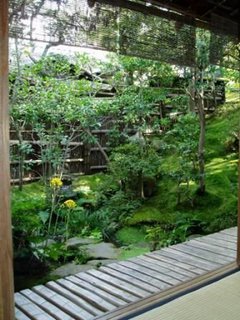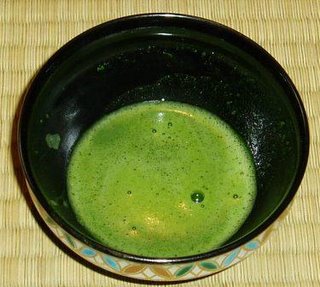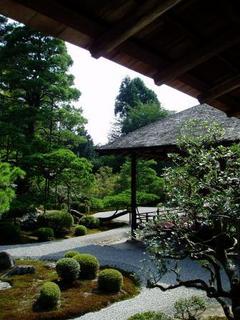Words are marvelous because they can work as a useful tool to explore possibilities to share with others with different views from yours.
12/28/2005
Siva's view 2: the Russo-Japanese War
But that was just a diplomatic victory. Kaneko Kentaro, a Japanese civilian and a friend of Theodore Roosevelt, the President of the United States, asked him to stop the war soon after Japan won just one of the battles in the north of the Liaodong Peninsula.
The battle was the first one of the three battles Russia had expected to have against Japan. But it didn't have enough capabilities and preparations for the three, so it exerted his own full power to win the first one, and asked the President of the USA to stop the war, in order for Japan to hold a dominant position in the meeting with Russia after the war.
Again, it was just a pseudo victory, but the Japanese people was led to think they were strong enough to let them think they wouldn't have to prepare for the WWII and improve any weapons that they had used. In the most parts of the WWII, the Japanese soldiers used the same weapons their fathers created twenty years ago!!
An European researcher, who had been living in Japan till it took up entering the wars and who left for her native country, made a compact and comprehensive remark on how Japan lost the wars to the other countries. She said, "Japanese cannot compare his own powers with others."
Siva also made the same comment. The Japanese leaders didn't. They should have tried to avoid the wars anyway. A war is just a good game for a stronger country. It was not so for Japan. Siva wondered how Japan chose to be involved in the war, and found the cause was the overestimation.
11/26/2005
Siva's View 1: Introduction
He, after the war, got the job as a newspaperman in a major newspaper publishing company, and was in the charge of cultural matters, including Buddhism and pictures. In 1959, he won the Naoki Prize with the novel, "Owl's Castle," and began to pursue how Japan survived and what persons, especially men, lived and worked in this country. His eyes were not limited to the country, but went to Korea, China, Mongolia, and Tatars, which culturally contributed to what Japan was, and I think "is". And his concern flew to the peoples living near Lake Baikal because they have the same genes as ours according to scientific scrutiniy. Some of the peoples were thought to leave to survive to Japan.
I'm going to describe what Siva discovered in each stage of the Japanese history.
11/13/2005
Hyotei
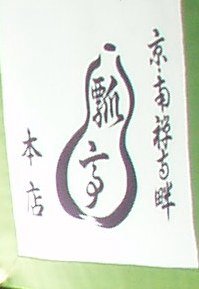
I went to one of the greatest traditional Japanese restaurants in Kyoto, the oldest city in Japan, named "Hyoutei." I'll describe how I ate marvelous dishes.
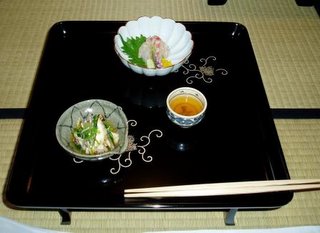
The first dishes were here.
The one over there is raw fish, Tai, one of the valuable fishes in Kyoto, while the one closer to you is a kind of salada with vinegar, full of matsutake, one of the most expensive mushrooms in Japan, cherished for its fragrance.
Well, let me describe what is the most important part in the room. In Japanese tradition, the part below is thought to be the most sacred in the room.
It should be noted that the flowers and the ornament you see in the photo have no relation with any religion. In Japanese tea ceremony, what matters most is tranquilty with which you do everyday-things, like enjoying seeing flowers and reading words, and having meals, and you're expected to do those things very beautifully there. By the time you pass away, you will have taken so many meals; however, you're required to cherish just one meal consisting of several dishes each of which has been elaborately cooked with so much care.
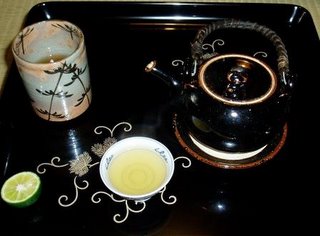 This is "dobin-mushi," which is explained in a book written by an American who is interested in Japanese cuisine, "delicate clear soup made in an individual miniature dobin ... [or] a famous autumn speciality of Kyoto and usually contains matsutake, chicken, mitsuba, and ginnan. The juice of sudachi is squeezed into the dashi, which is drunk from little cups. The other ingredients are fished out chopsticks and eaten. One of the great delicacies of Japan."
This is "dobin-mushi," which is explained in a book written by an American who is interested in Japanese cuisine, "delicate clear soup made in an individual miniature dobin ... [or] a famous autumn speciality of Kyoto and usually contains matsutake, chicken, mitsuba, and ginnan. The juice of sudachi is squeezed into the dashi, which is drunk from little cups. The other ingredients are fished out chopsticks and eaten. One of the great delicacies of Japan."
I ate seven dishes there. A meal, consisting of the seven dishes has been regarded here as the greatest and most gorgeous meal in Japan since the twelfth century. The second greatest meal has five dishes, and the third one three dishes. The photo on the left is one of the seven dishes, which comes third. The hard-boiled egg in this restaurant is well-known for its delicateness. I would recommend you to try this if you had a chance to eat there.
The last dish is the dessert, with which I concluded my special meal in Kyoto, with tea, called "matcha".
10/29/2005
Valuable Mushrooms

In the photo you are seeing the most invalueable mushrooms in Japan, maitake and matsutake, grilled in Japanese paper made from mulberry bark. The former mushroom is famous for its tasting greatest while the latter for its fragrance though non-Japanese may not love them to the extent to which many Japanese cherishe them. Anyway, they are too expensive here!!
9/18/2005
a Japanese Sweet

According to some non-Japanese I have ever met, Japanese desserts are not so sweet, not enough to satisfy them. This should be one of them. The semi-transparent cubes are agars made from kudzu, which in itself doesn't have any taste and needs flavor from the white soybean-flour-and sugar powder and the raw-sugar black syrup.
9/16/2005
Who caused Katrina?
The TV programs and websites has reported how some of Americans blamed President Bush and FEMA for their slow responses and alleged discrimination. But my rough scrutiny of the websites and the blogs conveying the views of some of you on "who is to blame?" has revealed that the damage would have been much smaller if the New Orleans Mayor Nagin, who looks an African American at a first glance, had followed the instructions prescribed in New Orleans Official website, that is currently unavailable unless you are qualified to see it.
I'm confusing and wondering why some of not only Americans but also the world has blamed the President so bitterly. To me, it's like a political teasing, as adopted by some of the persons who belong to minority groups. My study disclosed how the minorities in the US HAVE incurred so much distress, but it seems to me it is not fair. I'm sure that is not the way my American friends will do it.
8/23/2005
complicated
8/11/2005
China, that looks sly to Japan.
Japan has been avoiding exploring such area because it didn't want any trouble with China. Then, China began to do that. In this kind of case, many of Japanese think China should not do that if it doesn't want any trouble with Japan. But I know this kind of thinking looks a little bit abstinent to some of you. Do you think the Chinese move can be OK?
8/10/2005
Good!!
This seemed to be good to Japan because they will be likely to have an opportunity to exclude those representatives from the Diet, who were protecting the vested rights that they and their supporters had had, and tried to stop the reformations needed to update the Japanese governmental systems. One of the biggest troubles that Japan has had should be that Japan hasn't adjusted itself to the present era that began in 1989 after the end of the Cold War era. The governmental systems has been working in the same way as in the Cold War era, when Japanese economy worked well in the US-oriented world.
Anyway, it was good. What matters most is how many younger persons will vote in the general election on September, 11.
8/06/2005
Hiroshima's Mayor's Speech
7/31/2005
My Kyoto Memory
 I went to Kyoto with my friends last week. There are so many sights to see, but I wanted to watch most the temple of Manshu-in(曼殊院), located in the north east part of Kyoto. Its name comes from a Bodhisattva in Sanskrit, but it is not a Buddhistic temple in nature mainly because in the Edo Era many of the imperial Princes were required to live there as Buddhistic priests lest they should participate in the politics.
I went to Kyoto with my friends last week. There are so many sights to see, but I wanted to watch most the temple of Manshu-in(曼殊院), located in the north east part of Kyoto. Its name comes from a Bodhisattva in Sanskrit, but it is not a Buddhistic temple in nature mainly because in the Edo Era many of the imperial Princes were required to live there as Buddhistic priests lest they should participate in the politics.The prince who built this was Ryo-sho-Ho Sin-no (良尚法親王: 1622-1693), whose father, Tomohito Sin-no, was frequently invited to tea ceremonies hosted by Toyotomi Hideyoshi, the person in power during the second half of the Aduchi Momoyama Era, who tried to be a court noble to keep his dynasty secure. They came to have a close relation. Probably, that's why Tokugawa Ieyasu, the person in power during the Edo Era following Aduchi-Momoyama Era, should have disliked and tried to exclude the court nobles.
I got interested in Manshu-in because I saw some of the beautiful pictures of Manshu-in in some books, websites, and magazines. Then I read some of the articles about Manshu-in written by my favorite author, Siva Ryotaro, who stopped by Manshu-in to see the garden every time he visited Kyoto, and I was itching to see the garden of Mansu-in. Here are some features of the garden below, he mentioned.
- Traditionally, a garden can be looked upon as a picture or drawing in Japan. You can say the garden is the center of the temple. I mean they designed houses for the places to enjoy watching the gardens. In most cases, they describe seceneries seen in forests deep in mountains because they need them to see their survival game in the present world in perspective. As I should add, rich persons in Japan are expected to have such gardens with houses. The same is true of Manshu-in. There, the Imperial princes lived. They tried to enjoy that.
- Can you see the white sand in the picture on the left? It is the river running. This kind of drawing is called "Kare-San-sui." Can you see the corridor with handrails, running along the sand river? You're required to think the passage be part of a roofed pleasure boat with a tatami floor and shoji, on which Japanese enjoy watching good sights sometimes drinking. You have to walk the corridor, but in your imagination you are in the boat floating on the river to a place deep in the mountains, and you may find yourself in the Pure Land, if you immerse yourself in the drawing.
7/13/2005
No Justice
7/02/2005
A remark on a report by a Chinese
The report, he says, is the first chapter of the six. The other chapters, not published yet, are designed to describe 1) Japanese are ignorant of China and Chinese, 2) The good relationship among the East Asian countries (China, Korea, and Japan) has been destroyed by Japanese ally with the Western countries, 3) Japan is preoccupied with the illusion it has been superior to China, 4) China is requiring Japan not to give China much money but to show something sincere, and 5) Japan should ally with China to create a peaceful relation among China, Korea, and Japan, and to change the power balance in the world.
I love to read all of them. I cannot wait. The five topic sentences are attractive enough to drive me make small comments on them.
Concerning 1 and 3, I cannot say he isn't right. Some of us have categorized China as a developing country, based on the western standard of "progress," and we've been forced to update our concept of China. Now many of us recognize they don't know about China as well as Korea. But I would say this is vice versa. They don't know well about us, either.
As to the sign of "No Chinese," I'm not sure exactly why, but many of us guess some conflicts got the owner to hang out the sign. I would say they should have been caused by some cultural differences in manner, especially in distinction between public and private spheres. Bathhouses are both public and private places in Japan. There, you're required to keep some rules in your minds. I mean some Chinese would violate some of the rules common to many of Japanese. The owner, I would conclude, should have tried to preclude the bad-manner reputation because s/he was afraid Japanese customers would not come to the bathhouse.
It would be hard for me to explain and define all of the deeds that may look tacky to most Japanese. You know, customs and etiquettes in many cases refuse logical explanation. Japan has been an isolated island country since its birth, so it has engendered some cultural manners that may look absurd or illogical to you. And let me tell the Chinese it would take much more time to be familiar with a culture alien to you. Some say your three year stay would make your host country look so bitter. I have studied in a graduate school in US, but I would not like the US unless I had got two kind American friends there. The impression of a host foreign country, I would say, depends to some degree upon your company there in the first stage of your conformity to the country.
Additionally, Chinese are notorious for two reasons. First, I hear that many of Chinese don't adjust themselves to foregin environments even if they have to settle there. More important, we're scared of the Chinese because we know they come to Japan to earn just money, even if they dislike and hate Japan, and then commit crimes. Of course, it may be just rumors. But if your countrymen are assaulted by some persons belonging to one single group, some of us should be so scared of the whole group as to make a rule to preclude them. Anyway, we need to talk for mutual understanding.
His assertions in 2 and 5 sound quite interesting and right, but this is a matter of ours, as was in the early stage of the 20th century. One of the Japanese intelligensia proposed then Japan should get out of the East Asia to survive in the World revolving on the Imperialism. We don't think the judgment was the most appropriate, but we don't criticize it as the most inappropriate. Let us think about it, anyway.
The statement in 4 concerns historical matters. We're wondering why some of the Chinese like to criticize Japan referring to what it did in the past in spite of their recognition that Japan was not quite cruel and evil. The late Chinese leaders, like Deng Xiaoping, Chiang Kaishek, and Mao Tse-tung, suggested that Japan should not be blamed in their writings. I cannot trust those Chinese who know they should not criticize Japan but have criticized it for their own purposes.
6/19/2005
remaining or forged?
You could read this to learn that the US supported South Korea to create the hostility to some degrees after the WWII.
6/01/2005
Antiwar Pact
5/29/2005
The End of the Spring
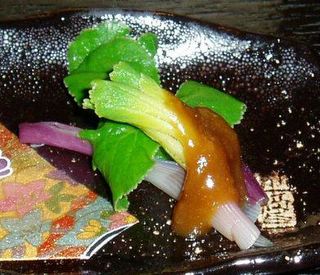 I went to Yuto, one of the authentic Japanese traditional restaurants, where I ate hamabohfu in the picture, a wild plant which grows on the seacoast and creates a wind blowing in your body after you eat it. My experience has revealed wild plants have something special that cannot be found in vegetables grown in the fields partly because wild ones have survived by its own survival power in the environment, without any recourse to human care including organic fertilizers.
I went to Yuto, one of the authentic Japanese traditional restaurants, where I ate hamabohfu in the picture, a wild plant which grows on the seacoast and creates a wind blowing in your body after you eat it. My experience has revealed wild plants have something special that cannot be found in vegetables grown in the fields partly because wild ones have survived by its own survival power in the environment, without any recourse to human care including organic fertilizers. 5/27/2005
Anti Binary Oppositions
A Japanese was killed in Iraq, who was employed as a bodyguard or something in a company. We will never forget two innocent Japanese have been killed in Iraq. Japan may have looked offensive to some in supporting the USA in the war and sending the army there, but we're adamant that the Japanese army was sent there to keep some area ivolved peaceful. I mean Japan was trying to play a different role in Iraq from the ones any other country did. You will see how many of Japanese dislike binary oppositions after studying about Japan. Our detachment from the oppisitions, which may seem to be vague, would be found in the history of Japan except in the first half of the twentieth century. Anyway, we will never forget those killings while I know some would think Japan was against them.
5/01/2005
Tragedy
A lot of stories have been narrated here concerning the persons who cannot tell us any longer about themselves and anything that they were going to do on that day and the days to follow. One of them was a girl, who lost her mother several years ago and had played the role of the mother in her family. She encountered the accident on the way to her first overseas trip to Korea since her mother's death.
An accident takes place anytime anywhere. Seeing that disaster, a Japanese is led to think he or she might have incurred that tragedy, while some of us thinks it was caused by mistakes of the motorman or the company that gave him a tight schedule or much pressure. I belong to the former.
I was most depressed when I heard a saying of a middle-aged man who was bereaved of his wife. He said, "I don't know why my wife encountered the accident because I didn't think she had done what God dislikes. We have been working diligently without committing any harmful things, ... I don't know why God gave it to my wife."
Some facts are difficult to overcome or accept. What should you do when you encounter such tragedies like the deaths of the persons you cherish most? Can you give me or him an answer?
4/28/2005
Mistake
4/24/2005
Japanese textbooks
We know invasion is so bad, and if our grandfathers did it to the Koreans and Chineses we ought to feel sorry for that, as our grandfathers would do so. But we cannot help starting with "but...". Because our survey on many records and reports about the war, available to us now, has compelled us to wonder why only Japan has been criticized so bitterly as to be called the evilest country that had ever existed in the history of the Earth. Japan was bad, indeed, to colonize Korea and assault China, and to make the surprise attack on the American army at the Pearl Harbor. But let me ask you if other countries including China did not do anything harmful or cheating during that period. Our survey reveals the war was not so simple. The situation was so complicated. The textbooks to be adopted in Japanese school, called nationalistic in some medias in the world, referred to what other countries did during the war, to describe the world as it was, so I don't think it is trying to legitimate what Japan did during the war. It just wanted to give children as accurate an description of the world in the first half of the 20th century as possible.
4/17/2005
Another big difference
Japan is an isolated island country, into which many of Japanese were so confined that I felt as if we were prohibited from assuming a wide view over what was happening the world. I might be sensitive, but I always feel uneasy when thinking about the small island country in the big world.
It seems I may be a little bit dissed....
4/15/2005
To Koreans and Chinese whom it may concern,
But we don't think Japan was right in invading your countries. We agree with you that, whatever reason, Japan should not have followed the imeperialistic policy even if it was adopted by several Powers, against which Japan was fighting except you two. But Japan found no other way but to follow that. Therefore, the government has apologized for that, and many of us don't think the government should withdraw the apologies it has expressed to you.
In short, Japan has done two different things at once recently. It has apologized for what it did against you during the war, and tried to find the true reasons why it committed the wrond deeds because we don't want our children to reap the causes when they grow. This might be fullfilled when the war is seen as it was. And some of the Japanese deeds have been found that do not seem to be so wrong. But again, we're not going to justify what our grandfathers did against you. In other words, apologies cannot be enough to show our determination of not making the same mistakes.
4/13/2005
Korea is different from China
Korea has also been protesting against Japan for the same reasons, but this country is different from China, you should notice. Korea has been struggling to change. Some of the professors in Korean universities are beginning to admit that Japan was not quite evil in invading Korea. That is, they are beginning to know how the war looked not only to Korea but also Japan. A war is not so simple as to be attributed to one single cause. Japanese invasion over Korea was also caused by complicated circumstances.
4/10/2005
different interpretations.
4/02/2005
Intelligence
I saw the report by the commission ordered by President Bush to trace the misjudgement about the weapons in Iraq. After reading that report, I brought myself to wonder why we need intelligence. It should be used to judge troubles beyond our knowledge. If they don't judge, that failure of such a magnitude may be avoided.
But this is also incorrect. President Bush would tell me that not all of the human beings have had reason, so we need to get accurate intelligence timely.
3/22/2005
What is the Buddhahood?
Some of you would wonder on what doctrine or from what view buddhists would think it possible. It's because of the Buddhistic view that each of any living and non-living things should look different in this world, but actually they are parts of the single whole entity. In Buddhism, any living and non-living things you can see through any medium in this world are regarded as amalgams of materials in which older materials decay and are replaced with new ones continually. It follows that some pieces of your body will be useful in other living or non-living things in the future, while the other fragments may have been parts of the body of a Lion in Africa. It means we, including of all of you, belong to the one. This realization enables you to love others, living or non-living, deeply and involuntarily as you love yourself. The second advantage will come to you when you see the realization a fact, not a realization. Buddhism, in a sense, you can say, shows the ways how you see the realization a bald fact.
3/20/2005
How to avoid the four unavoidable pains in Buddhism
3/18/2005
The Unavoidable Four Pains in Buddhism
3/16/2005
MacArthur and Takeshima
In 1941 the war happened and in 1945 Douglas MacArthur came to Japan as the President of the GHQ. He, when leaving Japan, took the rights of surpervising Takeshima temporarily as well as Okinawa and Ogasawara islands, and gave them to the American Army in Korea. Okinawa and Ogasawara islands were returned to Japan soon but Takeshima was neglected. Probably, the Americans must have forgotten about that island because it was so small an island that it was not found in the maps used before in Korea(but Korea alleges that Takeshima was discovered by a Korean in the 6th century). In 1953 Korea began to say "it is ours." Japan has made claims about this and the US agreed, but Korea ignored that protest and put the army over the island because Japan was not allowed to use the army.
This case should be judged depending on the international law, which says an unidentified island should belong to a country which has owned it for longer time without any trouble. Japan has the fact, but Korea didn't, so Korea needed to create the fact that Korea supervised the island peacefully. One of the ways for Japan to prevent Korea from continuing the illegal occupation of the island is arousing a trouble. Simane Prefecture passed the article by which the day is set of the 100 anniversary of the island's being owened by Shimane Prefecture. Some Koreans called this decision evil. I cannot understand them, but we also know the reason. In Korea, like in China, they learned the limited history, because the governments choose what should be taught to them to arouse nationality and loyalty in the nations(you can see in the textbooks in Korean school the description that Takeshima was one of the areas invaded by Japan in the WWII) . Anyway, when watching a Korean cutting his or her finger, I didn't find what Japanese should do.
But now I know. I should let many of them know the fact that they have been taught distorted facts. So i wrote this.
3/04/2005
Mystery or Miracle
On that day, in the evening, I was going to a fifteen-years-old city theatre to listen to Symphony No. 7 of Bruckner, played by GewandhausOrchestra Leipzig and conducted by Herbrt Blomstedt. But I chose this neither because the orchestra and the conductor were great nor because I love Bruckner. Those could not be enough for me to decide to buy an expensive ticket for that concert on the day, the deathday of Mr. K, a teacher who taught me Faulkner and classical music. He was said to be queer in aesthetics, but I shared it with him. And he also loved Bruckner, as I do. When I found a poster to let us know the concert would be held, it was as if his motto reiterated in my mind, "something moving can be the motif for you to live, work, and survive in the world, so you have to keep your sensibility working; therefore, you have to give yourself so many opportunities to move you." And I also remembered how happy he looked when he was preparing to leave his office for the concert theatre to listen to Bruckner, who was his cup of tea.
My wife, I guess, is an esoteric buddhism worshipper in some cases. You know, Esoteric Buddhism would be a little bit different from other sects of Buddhism in that, according to the doctrine, you could be allowed to get a magical power or a clearest insight to enable you cause miracles. Probably, on that day, she got the power, so she picked up a Schricht's Bruckner No. 7. without knowing anything about the concert and classical music. She is not interested in classical music as art but as a cradle song. Nevertheless, she chose the one the teacher mentioned as the best conductor for Bruckner's No. 7.
Blomstedt performed terribly cool and great. I clapped so much, murmuring "thanks, Mr. K."

